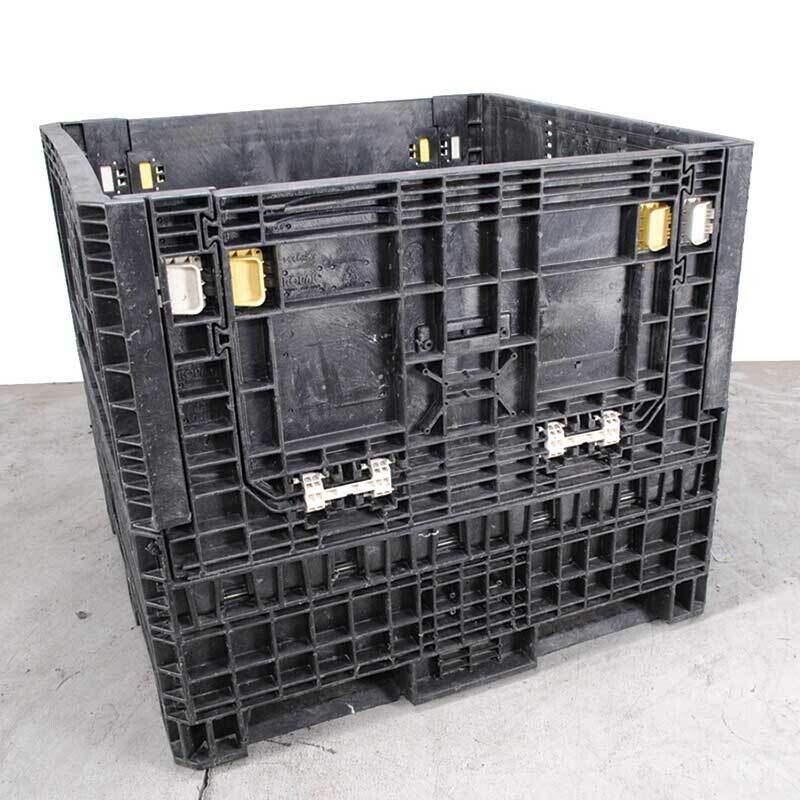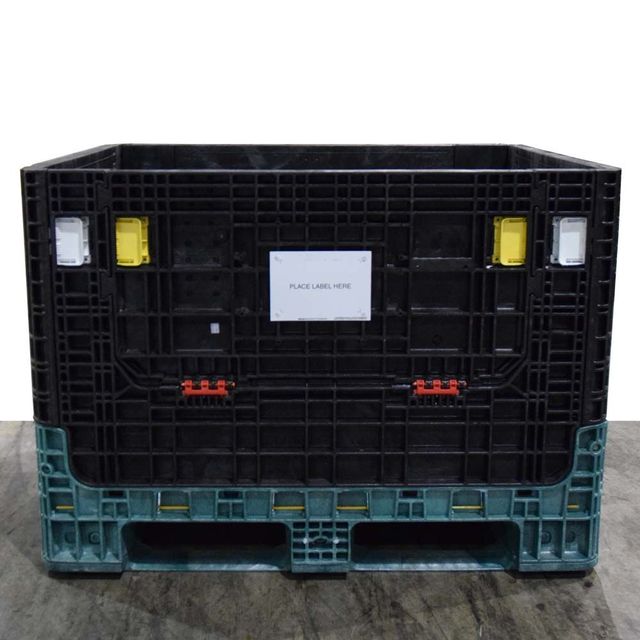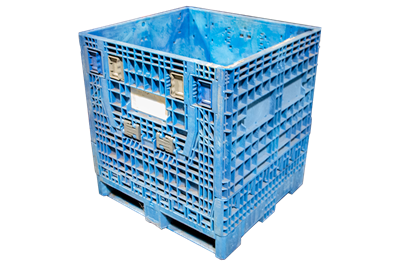Learn why refurbished bulk containers are preferred by logistics and storage experts
Why Mass Containers Are Crucial for Lasting and Cost-Effective Transport
Bulk containers play an essential function in contemporary logistics. They promote the efficient activity of large quantities of goods, thus enhancing transport procedures. This approach not just reduces costs but likewise decreases environmental influence with reduced exhausts and waste generation. As sectors seek more sustainable methods, the fostering of mass containers is becoming progressively significant. What effects does this shift hold for future logistics and supply chain monitoring?

The Benefits of Using Bulk Containers in Logistics
Bulk containers revolutionize logistics by boosting efficiency and sustainability. These containers enable for the transportation of large quantities of items in a single journey, markedly lowering the variety of journeys called for. This not just simplifies procedures but additionally decreases labor prices connected with handling, filling, and unloading. On top of that, bulk containers are developed to enhance room usage within transportation lorries, making certain that more products can be shipped concurrently.
The standardization of bulk containers also streamlines the logistics process. With uniform dimensions, they can be conveniently piled and kept, leading to boosted storage facility administration. Additionally, mass containers usually feature long lasting materials that secure components from damage during transportation, therefore decreasing item loss and raising general integrity. Consequently, companies can experience enhanced supply chain efficiency, inevitably causing increased productivity and consumer fulfillment. This combination of variables makes mass containers an important property in modern-day logistics.
Environmental Impact: Decreasing Waste and Carbon Impact
As industries progressively focus on sustainability, the adoption of bulk containers has emerged as a key method for minimizing waste and reducing carbon impacts. These containers reduce using product packaging materials, such as boxes and plastic, therefore notably lowering overall waste generation. By combining deliveries, bulk containers improve transport performance, permitting more products to be carried per journey. This reduction in trips directly associates with reduced greenhouse gas exhausts, adding to a smaller sized carbon impact.
Furthermore, mass containers can frequently be recycled or reused, additionally mitigating ecological impact. The resilience of these containers warranties they can endure numerous transport cycles, minimizing the demand for single-use choices. used plastic containers. By simplifying logistics and promoting efficient source use, bulk containers not just support sustainable techniques yet also encourage sectors to align with worldwide environmental goals. Ultimately, their application reflects a dedication to eco-friendly stewardship and responsible resource administration
Cost Savings: Exactly How Mass Containers Lower Transport Expenditures
While many business seek methods to enhance their bottom line, the usage of bulk containers provides a substantial opportunity for lowering transport expenditures. Bulk containers make the most of the quantity of products transferred, allowing organizations to deliver larger amounts at the same time. This performance decreases the variety of journeys called for, straight reducing fuel prices and minimizing labor expenditures connected with loading and dumping.
Additionally, bulk containers frequently feature structured layouts that optimize area usage within transportation vehicles. This means fewer voids, bring about more efficient usage of available capacity. The durability of mass containers can reduce the risk of product damages throughout transportation, making sure and minimizing losses that more items arrive undamaged.
Enhancing Supply Chain Performance With Mass Storage Solutions
Mass storage services play a necessary role in boosting supply chain efficiency by enhancing stock administration. By combining items into fewer, larger containers, businesses can significantly decrease handling prices related to regular transfers and processing. This structured technique permits better monitoring and administration of supply, eventually resulting in boosted operational performance.
Structured Inventory Administration
Reliable stock management is essential for maximizing supply chain operations, especially when organizations take on bulk storage options. These services make it possible for services to keep higher supply levels while decreasing the regularity of replenishment. By combining products into mass containers, firms can improve their supply processes, reducing the complexity related to tracking multiple smaller sized plans. This method promotes accurate inventory matters and boosts forecasting precision, enabling more enlightened decision-making. Additionally, mass storage services streamline warehouse organization, making it much easier to situate and access items when needed. Consequently, organizations can accomplish an extra reliable supply turn over rate, inevitably enhancing overall supply chain performance and lowering the chance of stockouts or overstock situations.

Lowered Handling Expenses
The execution of bulk storage solutions not only streamlines supply monitoring yet additionally significantly lowers handling costs throughout the supply chain. By combining materials into mass containers, companies lessen the demand for regular handling and transfer between various storage space and transport systems. This method reduces labor costs associated with loading, unloading, and moving smaller sized packages. Furthermore, mass storage space decreases the frequency of shipments, leading to lower transportation costs and lowered gas intake. As an outcome, businesses can optimize their logistics operations, enabling for a much more effective allotment of sources. Ultimately, decreased handling costs add to enhanced overall supply chain efficiency, cultivating a setting that sustains both sustainability and economic stability.

Flexibility of Mass Containers Throughout Numerous Industries
Numerous markets have distinctive needs for transportation and storage, mass containers have emerged as a flexible option that fulfills a broad variety of demands. These containers, ranging from large containers to specialized containers, can accommodate diverse materials, consisting of granules, fluids, and powders. In the agricultural industry, bulk containers help with the transport of grains and fertilizers, while the food and drink sector uses them for components and completed items. The chemical market depends on bulk containers for safely delivering harmful materials, guaranteeing compliance with safety and security policies. Additionally, construction companies gain from mass containers for delivering aggregates and other products. Their flexibility encompasses different modes of transportation, consisting of ships, trains, and trucks, improving logistical effectiveness. This flexibility not just simplifies procedures throughout different markets however likewise advertises sustainability by reducing packaging waste and maximizing space in transportation. Bulk containers play an essential duty in contemporary supply chain management.
Future Patterns in Mass Container Usage and Sustainability
The future of mass container usage is progressively formed by ingenious materials growth that improves sustainability. In addition, automation in logistics guarantees to streamline operations, reducing waste and enhancing effectiveness. Welcoming circular economic situation methods will even more revolutionize how bulk containers are made, made use of, and reused, fostering a much more lasting transport landscape.
Innovative Products Growth
As markets progressively prioritize sustainability, innovative materials advancement wholesale containers emerges as a considerable factor in boosting green transportation remedies. Suppliers and researchers are checking out naturally degradable plastics, recycled compounds, and light-weight metals to decrease ecological influence. These materials not only reduce waste yet additionally improve fuel performance by decreasing used collapsible containers the overall weight of containers. Furthermore, advancements in smart materials, which can adjust to differing problems, boost the sturdiness and functionality of bulk containers. The assimilation of these cutting-edge products aligns with circular economic climate principles, advertising reuse and recycling. As the need for lasting techniques expands, the development of such materials will certainly play an important function in forming the future of bulk container usage in logistics and transportation.
Automation in Logistics
Significant improvements in automation are poised to transform logistics and the utilization of mass containers, boosting sustainability in transport. Automated systems, including drones and autonomous lorries, are simplifying the motion of bulk containers, reducing the dependence on traditional fuel-powered transportation. These innovations optimize transmitting and filling processes, improving and decreasing vacant miles fuel efficiency. In addition, automated stock management systems boost tracking and surveillance of bulk containers, guaranteeing better source allotment and minimized waste. The integration of the Internet of Things (IoT) allows real-time data analysis, allowing proactive decision-making that aligns with sustainability goals. As automation proceeds to develop, it is anticipated to drive additionally developments wholesale container use, eventually sustaining more sustainable logistics techniques and decreasing the ecological effect of transport.
Circular Economic Situation Practices
Developments in automation are establishing the stage for a more incorporated approach to circular economic climate techniques in the domain of bulk container use. As industries increasingly accept sustainability, mass containers are being created for long life and reusability. This shift not just minimizes waste but likewise boosts resource efficiency. Business are embracing methods such as closed-loop systems, where utilized containers are collected, reconditioned, and reintroduced right into the supply chain. Additionally, wise innovations track container life cycles, assisting in better administration and lowering ecological influence. The partnership between makers, logistics service providers, and end-users is vital in developing criteria for lasting container usage. used plastic containers. Future fads show an expanding emphasis on products that are eco-friendly and recyclable, more enhancing the round economic situation's concepts wholesale transportation

Often Asked Concerns
What Products Are Mass Containers Generally Made From?
Bulk containers are normally created from durable materials such as high-density polyethylene, cardboard, aluminum, and steel. These products give flexibility, toughness, and protection, making them appropriate for transporting various products in various markets efficiently.
Exactly how Do I Pick the Right Size Bulk Container?
Picking the right size bulk container includes reviewing the volume of materials to be carried, taking into consideration dealing with devices compatibility, and assessing storage room demands. Correct dimension warranties efficiency in transportation and lessens waste throughout delivery.
Are Mass Containers Reusable or Recyclable?
Mass containers are commonly recyclable, developed for several journeys, boosting sustainability. Lots of can also be reused, depending upon the materials made use of. Selecting recyclable choices even more sustains ecological goals and lowers waste in transportation practices.
What Safety Rules Apply to Mass Container Transportation?
Security laws for mass container transportation consist of conformity with the Department of Transport standards, appropriate labeling of unsafe products, architectural honesty analyses, and adherence to weight restrictions to assure secure handling and stop accidents throughout transit.
Exactly How Can Companies Change to Using Mass Containers Effectively?
Services can transform to bulk containers by examining current logistics, training personnel on handling, buying suitable devices, maximizing inventory administration, and teaming up with suppliers to assure compatibility and efficiency throughout the supply chain.
As markets significantly focus on sustainability, the fostering of mass containers has emerged as a vital strategy for minimizing waste and decreasing carbon impacts. By consolidating materials into mass containers, business can improve their stock procedures, decreasing the complexity connected with tracking numerous smaller bundles. As markets significantly focus on sustainability, cutting-edge products development in mass containers arises as a significant factor in enhancing green transport remedies. Automated systems, consisting of drones and independent lorries, are simplifying the activity of mass containers, lowering the dependence on traditional fuel-powered transport. Furthermore, automated supply monitoring systems boost monitoring and surveillance of mass containers, making certain far better source allowance and minimized waste.